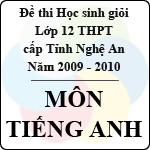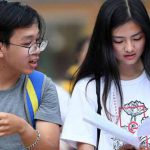Đề thi học sinh giỏi lớp 12 THPT tỉnh Nghệ An môn tiếng Anh (năm học 2009 – 2010), Đề thi học sinh giỏi lớp 12 THPT tỉnh Nghệ An môn tiếng Anh (năm học 2009 – 2010)
|
SỞ GIÁO DỤC VÀ ĐÀO TẠO ĐỀ CHÍNH THỨC |
KỲ THI CHỌN HỌC SINH GIỎI TỈNH LỚP 12 THPT ĐỀ THI MÔN: TIẾNG ANH – BẢNG B |
SECTION A: PHONETICS
I. Pick out the word whose underlined part is pronounced differently from that of the other words. Write your answer in the space provided.
1. A. university B. unique C. unit D. undo
2. A. walked B. threatened C. passed D. forced
3. A. too B. food C. soon D. good
4. A. legal B. legend C. generous D. manager
5. A. adventure B. future C. mature D. figure
| 1. | 2. | 3. |
| 4. | 5. |
I. Pick out the word that differs from the other words in the position of the main stress. Write your answer in the space provided.
6. A. comedy B. collection C. comical D. calculate
7. A. ambitious B. memorial C. memory D. mechanic
8. A. remove B. cancel C. copy D. answer
9. A. Japanese B. engineer C. practical D. questionnaire
10. A. document B. develop C. opponent D. astonish
| 6. | 7. | 8. |
| 9. | 10. |
SECTION B: VOCABULARY AND GRAMMAR
I. Choose the word or phrase which best completes each sentence.
11. The authority gathered those villagers ______ they explained the importance of forests.
A. who B. whom C. to that D. to whom
12. When he woke up, he realized that the things he had dreamt about could not ______ have happened.
A. possibly B. likely C. certainly D. potentially
13. – “Do you think the book is expensive?
– “Yes, it’s not ______ what we paid for it.”
A. worthy B. worth of C. worth D. valuable
14. Do you think there ______ less conflict in the world if all people ______ the same language?
A. would be/ spoke B. is/ spoke C. were/ speak D. is/ will speak
15. The new system didn’t ______ expectations.
A. catch up with B. bring about C. come across D. come up to
16. Before the meeting finished, they had arranged when ______ next.
A. they met B. they to meet C. to meet D. should they meet
17. Make sure you end each sentence with a ______.
A. dot B. full stop C. comma D. semi-colon
18. When he heard the joke, he burst into loud ______.
A. smile B. laughter C. amusement D. enjoyment
19. The traffic lights ______ to green, and the car drove on.
A. exchanged B. turned C. removed D. shone
20. It is a good idea to be ______ dressed when you go for an interview.
A. finely B. boldly C. smartly D. clearly
21. We were so late that we ______ had time to catch the train.
A. nearly B. almost C. hardly D. simply
22. They are going to make ______ excursion next month.
A. a two-week B. two-weeks C. two weeks’ D. a two-week’s
23. I haven’t had a very ______ week. I seem to have done nothing at all.
A. extensive B. productive C. enthusiastic D. economic
24. My brother had never been abroad ______ he joined the army.
A. since B. until C. during D. while
25. Do you know the man ______ over there?
A. interviewed B. interviewing C. to interview D. interviews
II. There is one mistake in each of the following sentences. Find and correct it.
26. His research for the thesis was more useful than her.
27. You can apply for a better job when you will have had more experience.
28. From 1865 to 1875, a remarkable various of inventions was produced.
29. She was used to do shopping on Saturday but now she doesn’t have time.
30. A smile can be observed, described, and reliably identify.
| MISTAKE |
CORRECTION |
MISTAKE |
CORRECTION | ||
| 26 | 29 | ||||
| 27 | 30 | ||||
| 28 |
III. Give the correct form of the words in the brackets in each of the following sentences.
31. I was annoyed at his (REFUSE)______ to co-operate.
32. The book doesn’t say much about prices, but it is very (INFORM)______ about everything else.
33. The noise (LESS)______ as the plane got farther away.
34. He lost in the election because he was a weak and (DECIDE)______ leader.
35. I couldn’t help it. The accident was (AVOID)______.
36. She was (EXTREME)______ knowledgeable about the history of China.
37. He was very (SET)_______ when his cat was run over.
38. Jackson had another violent (AGREE)_______ with the referee.
39. He is behaving in a very (MYSTERY)______way.
40. She studied (ECONOMY)______ at university.
SECTION C: READING COMPREHENSION
I. Fill in each numbered blank with one suitable word.
Australia is a big country, but nearly all Australians live near the sea. On hot summer days, you can see thousands of people at the beach. Many beaches have waves (41)______ are very high.
These large waves are known as surf and the people who ride them are called surfers. Surfing is a skill, and it needs learning. Don’t (42)______ to be able to surf properly the (43)______ time you try. However, by practising a few times you will learn (44)______ to do it.
Surfing is not a new sport. Perhaps its origins need explaining. It started hundreds (45)______ years ago in Hawaii. Men swam (46)______ to sea to catch fish and found they could come back to land very quickly by riding the waves. These first surfers did not (47)______ a board. They were “body surfers”. Many people (48)______ do this type of surfing today.
After a while people started to use boards and rode the waves by lying, kneeling or standing (49)______ them. These first surfboards were made of wood and the water made them rot after a while. Today, surfboards are made of plastic or fibreglass (50)______.
II. Read the following text and choose the best answer for the questions below.
Today, I’d like to begin a discussion on the problem of the heating up of the earth. First, we’ll touch on the relationship between fluorocarbons and the ozone layer. You probably remember that the ozone layer is the protective shield around the earth. It is important to all life, because it filters out harmful ultraviolet light from the sun. Ozone itself, a form of oxygen, is regularly made by the action of the sun in the upper atmosphere. It is also regularly destroyed by natural chemical processes.
The problem now is that too much of the ozone layer is being destroyed. Scientists suspect that certain chemicals, such as fluorocarbons, are contributing to the depletion of the ozone layer. And how do we use fluorocarbons? The most common uses are in spray cans and cooling systems. The chemical pollution from these fluorocarbons can account for some of the ozone losses that have been reported. There are, however, new studies linking the sun itself to the depletion of the ozone layer. We’ll go into that new study more next time.
51. Who is the most likely speaker?
A. A professor. B. A doctor. C. A mechanic. D. A chemist.
52. The speaker’s main topic is ______.
A. ultraviolet light B. the use of spray cans
C. air-conditioning systems D. fluorocarbons and the ozone layer
53. What is the most important purpose of the ozone layer?
A. Providing fluorocarbons. B. Shielding the sun.
C. Protecting the earth. D. Destroying chemicals.
54. What is the ozone layer made of?
A. Fluorocarbons. B. Oxygen. C. Shields. D. Ultraviolet light.
55. What will the speaker probably discuss next?
A. How to make air conditioners with fluorocarbons.
B. The sun as a cause of ozone layer depletion.
C. The make-up of the ozone layer.
D. Harmful effects of ultraviolet light.
Download tài liệu để xem thêm chi tiết











